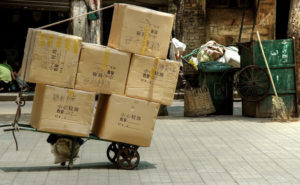Increasingly, we are living in a globalized society. Nowhere is this point made more clear than in the airline industry. A Boeing 787 aircraft, for example, is dependent on twelve different countries to supply the component parts. Certain countries specialize in the production of certain parts. Of course, you’d go to Japan for the wings and Italy for the center fuselage, but you’d be bonkers if you went anywhere other than Mexico for the reverse thrusters. When you put it all in a box and give it a good shake, what comes out is the prototypical American airplane. The same is true for other industries: when it comes to waste management, China is the world’s garbage can.
 Or at least it was. For decades, countries throughout the world have exported their recycling to China for processing. The Asian country shouldered approximately 45% of the world’s total recycling burden since 1992. The United States alone has been shipping 4,000 freight containers filled with recyclables to China- per day. Unfortunately, in a move characteristic of the trend towards nationalism, China has decided to close it’s borders. As of January 1st of this year, it has rolled out its National Sword policy, which bans 24 types of solid waste.
Or at least it was. For decades, countries throughout the world have exported their recycling to China for processing. The Asian country shouldered approximately 45% of the world’s total recycling burden since 1992. The United States alone has been shipping 4,000 freight containers filled with recyclables to China- per day. Unfortunately, in a move characteristic of the trend towards nationalism, China has decided to close it’s borders. As of January 1st of this year, it has rolled out its National Sword policy, which bans 24 types of solid waste.
It’s China’s way of saying, “We’re taking care of me and mines! Y’all figure out yo business.” This leaning towards self-interest comes as the country pursues a more aggressive anti-pollution stance. Unfortunately for the rest of humanity, researchers expect that a whopping 111 million metric tons of plastic waste will be displaced by 2030.
Countries that once relied on China to separate their paper from their plastic either do not have the facilities to process recycling, or simply do not have the man power. Even a country as rich in resources as the United States cannot make heads nor tails of what to do without their neighbor to the (far) east. Counties throughout the country are beginning to limit the types of recyclables sanitation workers will pick up on trash day and, in some cases, suspending recycling services completely until further notice. Other counties are content with keeping up appearances, collecting bottles and cans, cardboard and newspapers, only to send them straight to a landfill.
All is not lost, however, as the old adage proves once again to be correct: when one door closes, another opens. Middle Eastern scientists working in China have recently discovered that a fungus – yes, a fungus- enjoys snacking on plastic. Aspergillus tubingensis, has been found to degrade a type of plastic known as polyurethane in a matter of weeks. The discovery is considered a breakthrough since polyurethane can take anywhere from several decades to a millennium to decompose naturally. Polyurethane is used widely as foam for mattresses, coating for wood floors, and padding underneath carpets.
Despite its illustrious place in manufacturing, cynics who would poo-poo anything might point out that polyurethane isn’t even in the top five most used plastics. Alas, there is hope enough even for them. Fungi (as anyone with a shower curtain would know) is a persistent little bugger. So much so that some species of fungus, when matured into a “gall”, contain an estimated 25 billion spores, with each spore representing a potential for another 25 billion spores. Add to that the fact that humans have been lazy in cataloguing these often unwelcomed organisms: of the 3.8 million fungal species, only 144,000 have been identified.

Looking at it that way, the chances that another as yet unknown fungus would also have a penchant for plastic is actually quite good. Given the advances in scientific inquiry, it is also not out of the question that some budding researcher may genetically alter a species so that it would have an appetite for a targeted polymer. While on this train of thought, it’s worth noting that this year marks the 200th anniversary of Mary Shelley’s masterpiece. That last thing society needs is a Franken-fungus run amok- they’re hard enough to remove from the grout in between tiles as it is!



